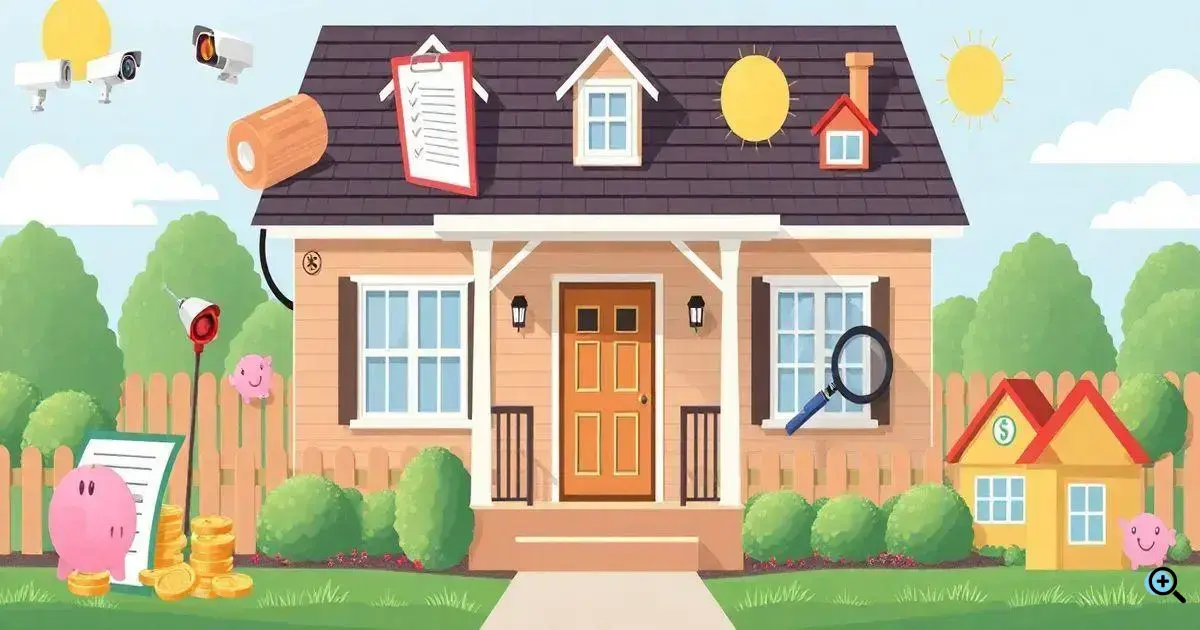Contents
- 1 1. Shop Around for the Best Rates: Compare quotes from multiple insurance companies to find the best rate.
- 2 2. Increase Your Deductible: Opting for a higher deductible can significantly lower your premium.
- 3 3. Bundle Your Policies: Consider bundling your home insurance with other types of insurance, such as auto insurance, for discounts.
- 4 4. Improve Home Security: Installing security systems and safety features can earn you discounts on your premiums.
- 5 5. Maintain a Good Credit Score: Insurers often consider your credit score, so keeping it high can help lower your premium.
- 6 6. Review and Update Your Coverage: Regularly assess your coverage and adjust it to avoid paying for unnecessary extras.
- 7 Frequently Asked Questions about Lowering Home Insurance Premiums
- 7.1 How can shopping around for home insurance save me money?
- 7.2 What is a deductible, and how does increasing it affect my premiums?
- 7.3 What are the benefits of bundling my home insurance with other policies?
- 7.4 What security features should I consider to lower my home insurance premiums?
- 7.5 Why is my credit score important for getting lower home insurance rates?
- 7.6 How often should I review my home insurance coverage?
- 7.7 What should I do if I find that I am paying for unnecessary coverage?
Home insurance is essential for protecting your most valuable investment, but it doesn’t have to break the bank. By following these practical tips, you can effectively lower your premiums without sacrificing coverage. In this guide, we present 10 actionable tips that will help you save money on your home insurance while still ensuring that you are adequately protected against risks.
1. Shop Around for the Best Rates: Compare quotes from multiple insurance companies to find the best rate.
When it comes to home insurance, one of the most effective ways to save money is to shop around. Insurance premiums can vary significantly between different providers, so taking the time to compare quotes can lead to substantial savings.
Start by researching various home insurance companies. Look for reputable providers with good customer reviews and a strong financial standing.
Obtain Quotes
Contact these companies to obtain quotes. This can often be done online, making it quick and easy to get a range of options.
Compare Coverage Options
While price is important, ensure that you are also comparing the coverage options. Cheaper policies may offer less coverage or higher deductibles.
Check for Discounts
Inquire about available discounts that can reduce your premium, such as multi-policy discounts, loyalty discounts, or those for safety features.
Read the Fine Print
Carefully read the terms and conditions of each policy. Look for exclusions or limitations that may impact your coverage significantly.
Discuss with an Insurance Agent
Consider consulting with an insurance agent who can help you understand different options and identify the best policy that fits your needs.
By taking the time to shop around and compare rates, you can uncover the best home insurance policy that not only fits your budget but also meets your coverage needs. Regularly revisiting your options ensures you are not overpaying as market rates and personal circumstances change.

One of the most straightforward ways to lower your home insurance premium is to increase your deductible. The deductible is the amount you pay out of pocket before your insurance coverage kicks in for a claim. By choosing a higher deductible, you can significantly reduce your monthly or annual premium costs.
Your deductible is essentially a risk-sharing arrangement between you and your insurance provider. When you agree to take on a larger portion of the risk (through a higher deductible), the insurer lowers your premium in return.
Many homeowners typically have deductibles ranging from $500 to $1,500, but opting for $2,500 or even $5,000 could yield greater savings.
Benefits of Increasing Your Deductible
Lower Premium Costs: Higher deductibles generally equate to lower monthly payments, giving you more budget flexibility.
Encourages Responsible Home Ownership: With a higher deductible, you may be less likely to file minor claims, which can preserve your insurance history and prevent premium increases.
Potential for Better Policy Options: Insurers may offer better or more comprehensive coverage options for policies with higher deductibles.
Considerations Before Making the Change
Financial Preparedness: Before increasing your deductible, assess your financial situation to ensure you can cover the higher out-of-pocket costs in the event of a claim.
Frequency of Claims: Evaluate your past claims history and consider how often you are likely to need to file a claim. If you rarely claim, a higher deductible might make sense.
Long-Term Savings vs. Short-Term Costs: While a higher deductible lowers your premium in the short term, consider whether you plan to stay in your home long enough to benefit from the savings.
Increasing your deductible can be a smart financial move if you are prepared to cover the additional costs out-of-pocket in exchange for lower premiums. Always weigh the potential savings against your ability to pay the deductible when filing a claim to ensure this strategy fits your financial situation.
3. Bundle Your Policies: Consider bundling your home insurance with other types of insurance, such as auto insurance, for discounts.
Bundling your home insurance with other types of insurance, such as auto or life insurance, is an effective way to save money on premiums. Many insurance providers offer discounts for customers who choose to purchase multiple policies from them, making it a win-win situation.
Bundling refers to the practice of purchasing multiple insurance policies from the same provider. It can lead to significant savings and streamlined management of your insurance needs.
Common Bundles
Common bundles may include home and auto insurance, as well as additional types like boat or motorcycle insurance.
Benefits of Bundling:
- Cost Savings: Insurance companies often offer substantial discounts for bundled policies, which can significantly reduce your overall premiums.
- Simplified Management: Managing multiple policies under one provider makes it easier to track payments, renewals, and claims.
- Consistent Customer Service: Having all your policies with one insurer can lead to better service and communication, as they can see all aspects of your coverage.
Considerations:
- Compare Premiums: While bundling can offer savings, it’s important to compare bundled premiums against individual policy rates to ensure you are getting the best deal.
- Coverage Adequacy: Ensure that bundling does not lead to any gaps in coverage or inadequate limits that could jeopardize your protection.
- Provider Reputation: Research the insurance provider’s reputation in terms of customer service and claims handling to make sure you are getting not just a low price, but also reliable coverage.
Bundling your home insurance with other policies can result in significant savings, simplified management, and more reliable service. However, it’s crucial to assess the value of the coverage and do your research to ensure that you’re getting both the best rates and suitable protection.

Enhancing your home security is not only crucial for protecting your property and loved ones, but it can also lead to lower home insurance premiums. Insurance companies often reward homeowners who take proactive steps to secure their homes with discounts on their policies.
Home security improvements can include a range of features such as alarm systems, surveillance cameras, deadbolt locks, and smoke detectors that reduce the risk of theft, fire, and other risks that could lead to insurance claims.
By demonstrating that you have taken these preventive measures, insurers may lower your premiums because the likelihood of a claim is reduced.
Benefits of Improving Home Security
Lower Insurance Costs: Many insurance providers offer discounts of 5% to 20% or more for homes with monitored security systems or other safety features.
Increased Safety: Enhanced security measures protect your home from burglary, fire, and other threats, ensuring peace of mind for you and your family.
Potentially Higher Property Value: A well-secured home can make it more attractive to potential buyers, potentially increasing its value.
Considerations for Home Security Improvements
Choose the Right Systems: Research various security systems and features to find ones that provide excellent protection and are recognized by insurance companies for discounts.
Installation Costs vs. Savings: Consider the upfront costs of installing security measures against the potential savings on your insurance premiums to ensure it’s a worthwhile investment.
Notify Your Insurance Provider: After improving your home security, inform your insurance company to ensure you receive any eligible discounts on your policy.
Improving your home security is a smart investment that not only enhances safety but can also lead to reduced home insurance costs. By installing appropriate security systems and features, you can protect your home while also taking advantage of potential discounts on your premiums.
Maintaining a good credit score is essential for securing favorable home insurance premiums. Your credit score plays a significant role in determining your home insurance premium, as insurers often use it to assess the risk of issuing a policy.
By keeping your credit score high, you can not only secure better loan terms but also lower your home insurance costs.
Understanding Credit Scores
A credit score is a numerical representation of your creditworthiness, derived from your credit history and financial behavior. Higher scores indicate lower risk to insurers, which can lead to lower premiums.
Many insurance companies utilize credit-based insurance scores as part of their underwriting process. A higher score can translate into better rates due to perceived stability and responsibility.
Benefits of a Good Credit Score
Homeowners with good credit typically pay less for insurance, with some studies indicating potential savings of 10% to 30%.
A good credit score can also qualify you for better interest rates on loans and mortgages, leading to further financial savings.
With improved credit, you may find it easier to secure financing for home improvements and other important projects.
Considerations for Maintaining a Good Credit Score
Monitor your credit report regularly for errors or inaccuracies that could negatively impact your score.
Consistently paying your bills on time is one of the most effective ways to maintain a strong credit score.
Avoid opening too many new credit accounts at once, as this can temporarily lower your credit score.
In conclusion, maintaining a good credit score is not only essential for your financial health but also helps lower your home insurance premiums. By being mindful of your credit habits and taking proactive steps to improve your score, you can enjoy significant savings on your insurance while enhancing your overall financial profile.
6. Review and Update Your Coverage: Regularly assess your coverage and adjust it to avoid paying for unnecessary extras.

Regularly reviewing and updating your home insurance coverage is vital to ensure you’re not overpaying for unnecessary extras. As your life circumstances change, your insurance needs may also shift. By frequently assessing your coverage, you can make better decisions that reflect your current situation and potentially save money on your premiums.
Importance: Insurance needs evolve due to various factors such as home renovations, changes in household income, or new purchases. Failing to update your coverage can lead to either inadequate protection or paying for coverage that no longer applies.
Timing: It’s recommended to review your policy at least once a year or after significant life events.
Benefits
Customized Coverage: By adjusting your policy to match your current needs, you can ensure that you are adequately protected without excess coverage.
Cost Savings: Identifying and removing unnecessary coverage can help reduce your monthly premium, keeping more money in your pocket.
Improved Peace of Mind: Knowing that your insurance is tailored to your current situation provides reassurance that you are adequately protected.
Considerations
Understand Policy Limits: Ensure you have a clear understanding of your policy limits and whether they are sufficient for replacing current assets.
Additional Coverage Requirements: If you’ve made significant improvements to your home or acquired valuable assets, you may need to increase your coverage limits.
Consult with Your Agent: Working with your insurance agent can help clarify your coverage needs and ensure you’re making informed decisions.
Regularly reviewing and updating your home insurance coverage is essential for ensuring that you pay only for what you need. By tailoring your policy to align with your current circumstances, you can avoid unnecessary expenses and maintain peace of mind knowing you are adequately protected.
Finding ways to lower your home insurance premiums is essential for maintaining financial health while protecting your valuable assets. By implementing the strategies discussed, you can significantly reduce your costs without compromising the quality of your coverage.
Key Points:
Strategies to Lower Home Insurance Premiums
Shop Around for the Best Rates: Always compare quotes from multiple insurance providers to ensure you get the most competitive rates.
Increase Your Deductible: Opting for a higher deductible can lead to substantial savings on your premiums.
Bundle Your Policies: Combining your home insurance with other types of insurance can yield significant discounts.
Improve Home Security: Enhancing your home security with effective systems can lead to premium reductions.
Maintain a Good Credit Score: A strong credit score can positively impact your insurance rates.
Review and Update Your Coverage: Regularly assessing your insurance needs helps you avoid paying for unnecessary extras.
By taking proactive measures to manage your home insurance, you can enjoy peace of mind, knowing that you are adequately protected while also being mindful of your budget. Consider these tips to achieve a balance between quality coverage and financial savings.
Frequently Asked Questions about Lowering Home Insurance Premiums
How can shopping around for home insurance save me money?
By comparing quotes from multiple insurance providers, you can find the best rates that suit your coverage needs, potentially leading to significant savings on your premiums.
A deductible is the amount you pay out-of-pocket before your insurance coverage kicks in. Opting for a higher deductible typically results in lower monthly premiums, as you assume more risk.
What are the benefits of bundling my home insurance with other policies?
Bundling home insurance with other policies, such as auto or life insurance, can lead to substantial discounts, simplify management, and potentially improve customer service.
Common security features include monitored alarm systems, surveillance cameras, deadbolt locks, and smoke detectors. Implementing these can reduce the risk of theft or damage, leading to lower premiums.
Why is my credit score important for getting lower home insurance rates?
Insurers often use credit scores to assess risk. A higher credit score can qualify you for lower premiums, as it reflects your financial responsibility.
How often should I review my home insurance coverage?
It is recommended to review your home insurance policy at least once a year or after significant life changes, such as renovations or changes in household income, to ensure your coverage accurately reflects your current needs.
What should I do if I find that I am paying for unnecessary coverage?
If you identify unnecessary coverage during your review, contact your insurance agent to adjust your policy and remove any excess coverage, potentially saving you money on premiums.







